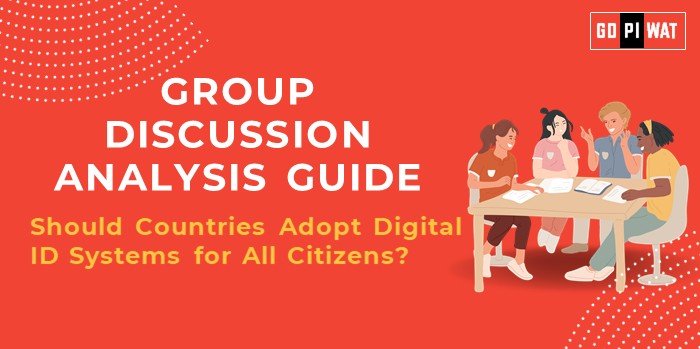📋 Group Discussion (GD) Analysis Guide: Should Countries Adopt Digital ID Systems for All Citizens?
🌐 Introduction to the Topic
Opening Context: In an increasingly digital world, digital ID systems are emerging as critical tools for governance, financial inclusion, and access to services. However, their adoption raises questions about privacy, security, and inclusivity.
Topic Background: Digital ID systems, such as Aadhaar in India or BankID in Sweden, aim to streamline service delivery and enhance identity verification. Global trends indicate their potential for economic empowerment, but concerns over misuse and accessibility persist.
📊 Quick Facts and Key Statistics
- 🌍 Global Adoption: Over 90 countries have implemented digital ID systems, with varying levels of success.
- 🇮🇳 India’s Aadhaar: 1.3 billion+ enrolled, with over 90% adult coverage, showcasing its scale but also its challenges.
- 💰 Economic Impact: Digital IDs could unlock $800 billion in economic value annually in emerging economies (McKinsey).
- ⚠️ Security Risks: 40% of global digital ID systems have reported breaches, raising cybersecurity concerns.
- 🏅 UN E-Government Index (2023): Estonia ranks highest for digital ID integration, followed by Singapore and Denmark.
🤝 Stakeholders and Their Roles
- Government Agencies: Policy formulation, implementation, and ensuring inclusivity.
- Private Sector: Providing technology infrastructure and innovation, managing data securely.
- Citizens: Adoption and responsible usage.
- International Organizations: Establishing global standards and addressing cross-border issues.
- Civil Society: Advocacy for ethical practices and protecting individual rights.
🏆 Achievements and Challenges
📈 Achievements:
- Service Accessibility: Aadhaar enabled 450 million Indians to open bank accounts.
- Economic Inclusion: Digital payments linked to IDs increased by 70% in 2023 in Africa.
- Fraud Reduction: Estonia’s e-ID eliminated 98% of ID-related fraud cases.
⚠️ Challenges:
- Digital Divide: Rural and low-income groups often face accessibility issues.
- Privacy Risks: Data breaches and surveillance concerns are prevalent.
- Global Comparisons: While Estonia leads in seamless integration, countries like Kenya struggle with implementation gaps.
📚 Structured Arguments for Discussion
- 🟢 Supporting Stance: “Digital IDs revolutionize access to essential services, fostering economic empowerment and reducing fraud.”
- 🔴 Opposing Stance: “Without stringent privacy laws, digital IDs could exacerbate surveillance and data misuse.”
- ⚖️ Balanced Perspective: “Digital IDs are transformative but require robust frameworks to address inclusivity and security.”
✨ Effective Discussion Approaches
- Opening Approaches:
- “Digital ID systems have proven transformative in countries like Estonia but remain controversial globally due to privacy concerns.”
- “Over 90 countries now use digital IDs—are we witnessing a digital revolution or a surveillance nightmare?”
- Counter-Argument Handling:
- Recognize privacy risks but highlight advancements like blockchain for secure data storage.
- Emphasize global success stories to counter concerns about implementation challenges.
🛠 Strategic Analysis of Strengths and Weaknesses
- 💪 Strengths: Enhanced service delivery, fraud reduction, economic inclusion.
- 🛑 Weaknesses: Cybersecurity risks, digital divide, implementation costs.
- 🌟 Opportunities: Global interoperability, AI integration, fostering innovation.
- ⚠️ Threats: Public resistance, geopolitical misuse, data breaches.
🎓 Connecting with B-School Applications
- 📌 Real-World Applications: Topics for research on governance, fintech innovation, and data privacy.
- 📖 Sample Interview Questions:
- “How can digital IDs enhance financial inclusion?”
- “What measures ensure data protection in digital ID systems?”
- 💡 Insights for B-School Students: Explore case studies on public policy or digital transformation frameworks.


